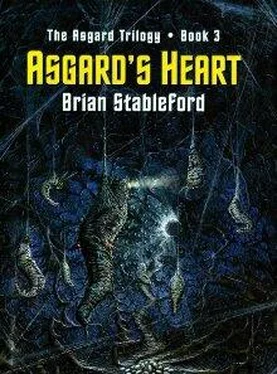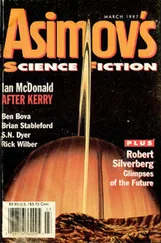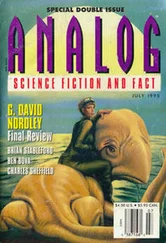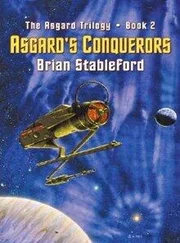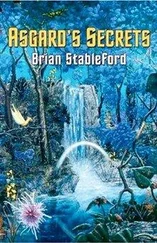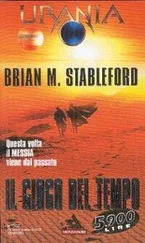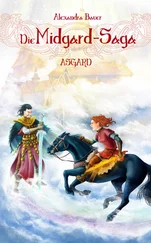I had been nursing the hope that whatever was inside Tulyar’s head knew the location of a dropshaft which could take us all the way down in one long, slow fall, but I’d been around Asgard too long to take it for granted that there was any through road from top to bottom, or even from middle to bottom. I knew that we had to be prepared to drive sideways across three or four more habitats, maybe for quite some distance. If the deck was really stacked against us, it might be ten or twenty, or a couple of hundred.
I wondered whether the thing which had taken over Tulyar’s body had undisputed sovereignty by now, or whether the Tetron was still in there, conscious of what was happening, struggling to recover the empire of his own soul. It was a morbid preoccupation, because I had no way to be certain that I wasn’t destined for the same kind of fate. At any moment, I might cease to be me, and become a warrior in some aeons-old conflict whose nature we had hardly begun to understand. To make myself feel better I imagined John Finn having to sit next to the pseudo-Tulyar, maybe realising by now that he’d been played for a sucker, and that even the Star Force would have looked after him better than the regiment in which he was now enlisted. I couldn’t find it in my heart to feel sorry for him—it was easier to ill-wish him with the thought that he had amply deserved the very worst fate which could possibly befall him.
Eventually, we came to the wall where both the tyre-tracks and the olfactory trace disappeared as if by magic. From where I sat the wall looked smooth enough, but there had to be a doorway there—an airlock guarding a shaft which was probably evacuated.
It was time for the clever suitcase to do her bit. She was hooked into the transporter’s systems by means of half a dozen leads; under her guidance the truck now began to extrude similar feelers from some secret place beneath its central headlight. I watched with some fascination as the feelers began to explore the wall, invading invisible seams and searching out hidden mechanisms. I have no idea what they did, or how, but it only took a few minutes. There was a sudden drain on the power-unit, and a section of wall retreated from the rest, and then slid sideways, after the usual fashion of Asgardian doors. As I had anticipated, there was a big airlock backed by a second door. The lock was only just big enough to take the transporter, and I couldn’t help wondering what would happen if and when we found a doorway that was too small for it to go through. Urania had assured me that we had more economical transporters stored somewhere in the back, but I hadn’t seen them.
Once we were inside the lock Clio closed the doors behind us, and set off the command sequence which would open the inner door. Urania confirmed that there was, as expected, no air in the shaft. At least some of the levels which it served must have reducing atmospheres. The shaft was easily wide enough to take the truck, but there was no platform on to which we could drive it.
“Well,” I said, drily, “We could hardly expect them to send it back up for us, could we?”
“Can we call it back?” asked Susarma. “How long will it take?”
Urania’s nimble fingers tapped away at the keys on the outside of her small, square sister. Clio had no screen to display words, but she was communicating with Urania somehow.
“We cannot bring the platform back,” she said, calmly. “It has been immobilised.”
I felt a bad mood creeping up on me.
“Can she tell how deep the shaft is?” I asked.
“Yes. It extends downwards for twenty-five kilometres.”
It wasn’t as big a drop as I had hoped; it was still one very tiny step toward the Centre, even if it did take us down further than the Nine’s robots had ever gone before. On the other hand, even that tiny step would be a giant leap for a man—and when he reached the bottom, the impact would reduce him to a very thin smear.
I had learned by now not to underestimate the Nine. They were used to this kind of problem.
“How do we make a new platform?” asked Myrlin.
“No need,” said Urania, simply. “We will descend by the usual method.”
“What’s the usual method?” asked Susarma, with a certain wariness in her voice.
The usual method of descent into a lower level for humanoid scavengers operating in the upmost four levels had involved the rigging of a block-and-tackle and climbing down a rope. She’d seen that for herself when we followed Myrlin down Saul Lyndrach’s dropshaft. But we were talking about a hole that was twenty-five kilometres deep, and it didn’t take a mathematical genius to figure out that we’d need a hell of a lot of very strong cable to lower an armoured truck that far.
“I guess we walk,” I said. “The way climbers go up and down chimneys. Brace ourselves inside the shaft, and let ourselves down, slowly.” I saw the expression of horror flit across Susarma’s face, and quickly added: “Not us as in you and me—the entire package. The truck can put out limbs as well as feelers. How many?”
“Eight,” replied Urania. “Four will hold us at any one time, while the remaining four seek a lower hold. But they will not have to brace us; the limbs are flexible, and can use organic adhesives to bond us momentarily to this kind of surface, and dissolve the bond with equal ease. Even so, it will be a long climb, and not so very comfortable.”
“Think of it as a new experience,” I said to Susarma. “We can be the first humans ever to get seasick while descending a drainpipe in the belly of a robot spider.”
“You must try to rest, Mr. Rousseau,” said the scion, solicitously. “There is nothing you need to do. Clio and I will manage the descent. You should rest too, Colonel Lear.”
It sounded like a good idea. I was all in favour of new experiences, but somehow I didn’t passionately want to be in the cab when the truck moved into the shaft. I was happy to believe that its extruded “legs” could secure us safely, but it was the kind of belief that might not be able to quell the anxieties triggered by one’s sense of sight. I could easily imagine my stomach turning over as we were picked up and drawn inexorably into position above that twenty-five kilometre drop. Anyway, I was hungry and thirsty.
There was just about room to stand up in the back of the truck, but if three or four people tried to move around all at once, the crowding quickly became absurd. There were four narrow bunks, two on either side, and as soon as I had a tube of food-concentrate and a bladder-pack of something to drink, I eased myself into the upper left. Susarma took the upper right, and Nisreen, who had been dozing in the lower right, went forward into the cab to join Myrlin and the Nine’s two ill-matched daughters.
I looked across at Susarma as I chewed my way through the flavoured concentrate. It didn’t taste any better than Tetron-manufactured manna, but it didn’t taste any worse either, and it was what I was used to. The colonel, to judge by her long-suffering expression, was still accustomed to food that did more favours for her palate. I sympathised, thinking how awful it would be if every single meal I ate conjured up memories of some long-ago feast the like of which I was unlikely ever to taste again.
“Does it strike you, Rousseau, that we’re a trifle redundant here?” she said.
“I don’t think it would constitute a fatal breakdown of Star Force discipline if you were to call me Mike,” I told her. “I tell everyone to do it, but no one takes a blind bit of notice. You have to expect formality from Tetrax, I guess, but you could surely make an exception.”
“Why break a habit just to pretend we know one another?” she countered. “Hell, Rousseau, I don’t know the first thing about you, for all the time I’ve been forced to spend in your company. Anyway, what I mean is, it seems to me that this fancy robot truck could do the job all on its own. It doesn’t need us to drive it, or to shoot its guns—that goddamn suitcase could do it all, couldn’t it? Even if the levers we finally have to pull are mechanical, the suitcase and the furry hermaphrodite could do the job. Why are we here, Rousseau?”
Читать дальше
